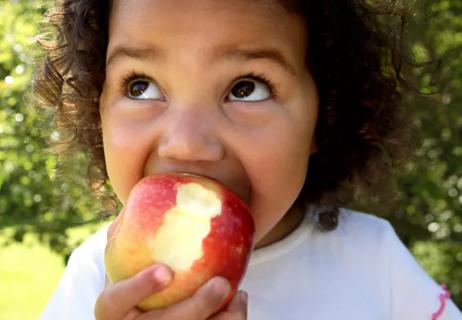Most kids get enough protein in a regular diet — too much can have side effects

Protein promotes healthy growth and development — so, of course, you want to make sure your kid is getting their fill.
Advertisement
Cleveland Clinic is a non-profit academic medical center. Advertising on our site helps support our mission. We do not endorse non-Cleveland Clinic products or services. Policy
But is more always better? Or can too much protein be harmful? We talked with sports nutrition specialist Diana Schnee, RD, LD, about kids’ protein needs.
How much protein your kid needs depends on their age, and for teens, their sex matters, too.
Here’s how much protein kids need each day, as recommended by the National Institutes of Health (NIH):
NOTE: These are average values based on reference weights for children and are not meant to be an exact protein prescription based on age.
If you’re not measuring, don’t worry: Odds are your child is getting enough protein.
“In most Western countries, children already get two to three times the protein they need daily. It’s uncommon for a child to need extra,” Schnee notes.
Should you use protein supplements to help ensure your kid is getting a little extra protein boost?
Probably not, Schnee says. “The focus should be more on adequate intake of whole foods as opposed to supplements.”
But taking in high amounts of protein is a popular trend among children, teens and their caregivers. That can be especially true for young athletes looking to bulk up and get bigger and stronger. They might turn to protein-packed supplements like:
Advertisement
That can be a problem. It’s easy to go overboard with supplements. Because they’re so concentrated, they make it easy for kids (and adults) to slurp down way more protein and calories than they’d naturally eat.
For example, a high-protein shake can have 30 grams of protein per bottle — comparable to a whole grilled chicken breast. But the chicken will be more filling than the shake, keeping kids fuller longer and leaving less room for snacks, sweets and other not-so-nutritious foods.
Too much protein can be unhealthy for kids (and adults, too). All that extra protein intake isn’t doing what you think it is.
Protein has a reputation for helping to build and repair muscles. And that’s true. But extra protein is simply that. Extra.
When kids get more protein than they need, it doesn’t mean they’ll grow more or build extra muscle. And it can lead to side effects.
“Excessive protein intake can put stress on the liver and kidneys, and it increases the risk for dehydration,” Schnee points out.
Let’s look at some of the potential side effects of excessive protein:
Kids and teens should get enough protein if they eat two servings of lean protein each day, give or take. Good sources include:
And while most kids are getting enough (or too much) protein, others could benefit from getting more to hit their daily intake goals. Your child may need extra protein if they:
Even in these cases, Schnee reminds us that whole foods, rather than powders and supplements, are typically the best way for kids to get the protein they need.
“Whole protein sources like meat, poultry, fish, dairy products and soy give kids a host of nutrients, in addition to the protein their bodies need,” she emphasizes. “Real food should be the first choice.”
There may be times when a healthcare professional advises a protein-packed powder or supplement for children, but that’s not standard for most kids.
If you’re concerned about your child’s protein intake, talk with a children’s health professional, like a pediatrician or pediatric dietitian. They can help you make sure your kid is getting the proper nutrition they need to grow and excel.
Advertisement
Learn more about our editorial process.
Advertisement

Look for snacks that are low in sugar and high in fiber, protein and healthy fats

Turn down the pressure, but don't stop offering

Kids typically get all the nutrients they need from food, but supplements can add peace of mind

The five major food groups offer different types of nutrients in the right proportions

Be a good role model, set family meal times and involve your kids in meal planning

How to keep kids' diets healthy while the sun heats things up

Fiber can lower blood pressure and promote healthy bowel function

Many active children don’t consume the recommended amounts

Wearing a scarf, adjusting your outdoor activities and following your asthma treatment plan can help limit breathing problems

Your diet in the weeks, days and hours ahead of your race can power you to the finish line

When someone guilt trips you, they’re using emotionally manipulative behavior to try to get you to act a certain way